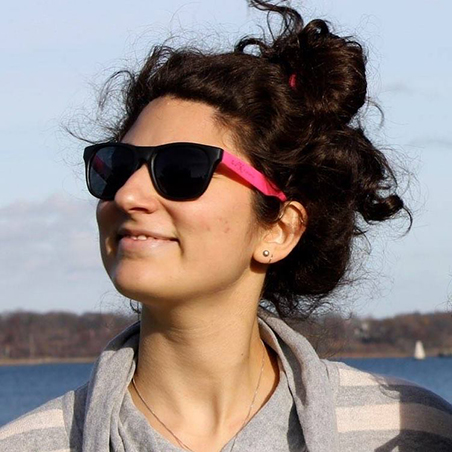Lia Milito
Fellowship Program Manager, Code for Canada
Bachelor of Arts (Hons.), Contemporary Studies and International Development Studies, 2010
I couldn’t imagine doing something that wasn’t helping other people.
“It was terrifying for a while,” says Lia Milito.
Lia had just joined a small team to create the start-up non-profit Code for Canada. The idea was good; the potential for helping Canadians was great. But could they make it work?
“There was a period of time where I would think this is leading to the job of my dreams. But at the same time I knew there was the possibility that it could all fall apart.”
Lia had learned how to deal with that kind of pressure when playing under the net, blocking shots, grabbing rebounds, and getting the basketball out to shooters for the King’s Blue Devils. She played basketball at King’s for four years, then for another year at Saint Mary’s University.
“It taught me how to push myself through tough times, knowing it would pay off. Competitive basketball prepared me for the kind of commitment and focus I’d need in a startup environment.”
As it turns out, Code for Canada didn’t fall apart. Much to the contrary. The big break came when the Government of Ontario became a partner in the spring of 2017. Then the federal government came on board. Lia was hard at work as Manager of the Fellowship Program.
The idea behind the Code for Canada fellowship is pretty simple. It provides opportunities for talented digital professionals with experience in web development, user experience design, and product management, to work with government teams to make government services more accessible and easier to use. Fellows from organizations like Code for Canada in other countries have developed digital government products to make it easier to start a small business in the United States, improve access to legal services in Australia, and make public transit systems more user-friendly in Mexico.
Lia believes the same sort of thing will happen in Canada. Governments will identify an opportunity or problem. Then she, as manager of the Fellowship Program, will recruit a team of digital experts to work with the hosting government. Through what they call an iterative process – testing assumptions, getting feedback, and then refining – a far better digital user experience will evolve. For her part, Lia says, a big part of the job is getting everyone on the same page.
“Public servants speak one language and developers and designers speak another. My job is to translate and create an environment where these two groups can understand each other and collaborate. And this is what King’s gave me. It’s such an interdisciplinary place- I learned how to distill what was important in one discipline and communicate its relevance to another discipline.”
Lia loves being able to apply the interdisciplinary communication skills she developed and honed at King’s in a way that makes life better for Canadians.
“I couldn’t imagine doing something that wasn’t helping other people.”
Posted: Jan. 2018
 Connect with Lia Milito
Connect with Lia Milito